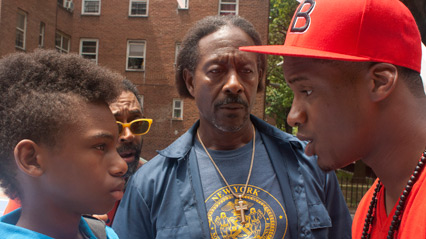
Written by Spike Lee
Directed by Spike Lee
USA, 2012
Spike Lee’s latest film might ask daring questions about community responsibility and black manhood, but these themes are not at all cohesively tied together. Red Hook Summer revolves around a privileged young boy’s summertime visit to his grandfather’s poor neighborhood of Red Hook, Brooklyn. Flik, who is already feeling rejected by his mother for being sent off is now cooped up with a preacher grandfather who confronts almost everything he does as inherently lazy or not worthwhile. Flik’s dad has been killed in Afghanistan so he has not had a positive male role model in his life for quite some time. The preacher is a fixture in Red Hook and while not universally respected, is revered by many of the devout. As Flik learns to trust him, so does the audience. The problem here is that for most of the story we are led to believe that how Flik is growing up and who he should look up to are of primary importance as to where Lee is taking us.
The character of the preacher is righteous and deals out condemnation severely but fairly. On the sidelines are the colorful characters of the neighborhood, poor but soulful people that Flik has been missing out on in the suburbs. They teach him lessons about how truly rough life can be but also how good friends can make it better. While it is true that he comes from a life of luxury (carrying around an iPad 2 everywhere), Flik has a wild soul. He runs around with a girl with an asthma problem and together they write in wet cement and steal bags of potato chips from the church pantry. The child actors deliver lines with spunk, so it’s a shame that oftentimes their acting seems stilted. The rest of the actors have lines that flow or stutter but never miss a beat. Conversations feel as if they are organic and everyone stumbles from one topic to another, always with a hint of faith in the all powerful or a bitter lack thereof.
Lee doesn’t want people to think that this is in any way a sequel to Do the Right Thing (although his character Mookie makes numerous appearances here) but it is still a movie that – like Right Thing – fundamentally speaks to what brings a community together and what can tear it apart. Red Hook starts out quite honestly touching upon the need for positive black male mentors but then sabotages itself with a detour into another film entirely.The audience remains captivated with Flik and his run-ins about the neighborhood until there is a sharp curve in the plot. From that point on it is hard to tell what Lee is trying to say about what exactly the neighborhood needs, the nature of redemption and what can be forgiven. Are there some things that are unforgivable or beyond putting firmly in one’s past? Rainbows literally appear at the very end of the story as if Lee has dismissed the abrupt revelations and everything disturbing can be put to rest without further discussion. Lee loves tackling controversial subject matter but basically derails and ends Flik’s summer of learning with a enormous question mark. We know that Flik has had life changing experiences but we hear no judgement from him about the last set of events. For Flik and the audience the issue brought up is serious enough that it creates a wound that warrants decoding, making sure we know what Flik feels about this and what his community will go on to do. Instead of healing us, Lee leaves us speechless and with an open wound.
“Who are young boys to look up to if even their trusted neighborhood protectors and defenders of?”
– Mookie from Do the Right Thing
Lane Scarberry




